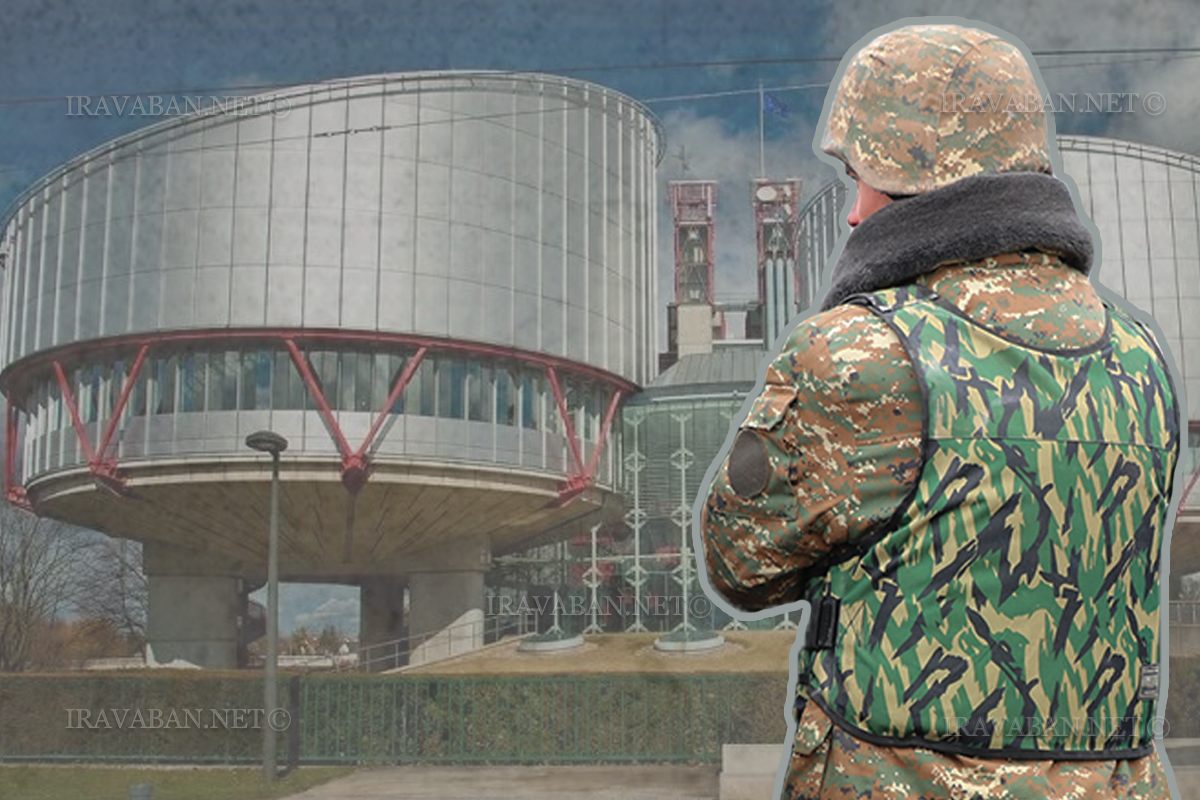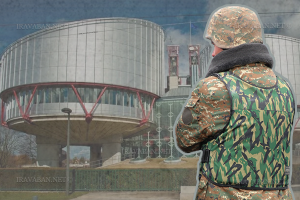The European Court of Human Rights has published its judgment in the case of “Varyan v. Armenia”.
According to Iravaban.net, the case concerns the alleged suicide of the applicant’s son during military service and the subsequent investigation.
Background of the Case
In 2011, the applicant’s son, 18-year-old Tigran Varyan, was conscripted into the Armenian army.
The applicant claimed that her son was deemed fit only for non-combat service due to his health condition. The government disputed this, stating that T. Varyan was recognized as fit for combat service. In this regard, they presented a copy of T. Varyan’s personal file from the military commissariat, which shows that during the conscription medical examinations, he was diagnosed with mitral valve prolapse leading to mitral valve insufficiency (a heart condition where a certain amount of blood flows in the wrong direction because the flaps of the valve between the two left chambers of the heart do not close smoothly or evenly when the heart contracts). This personal file contains the decision of the Central Medical Commission recognizing him fit for combat service.
Subsequently, T. Varyan was assigned to serve in the armed forces of Nagorno-Karabakh.
On February 29, 2012, T. Varyan was found dead with a gunshot wound to the lower jaw, inflicted by his assigned rifle.
Investigation into the Death of the Applicant’s Son
On February 29, 2012, the Third Garrison Investigation Department of the RA Ministry of Defense Investigative Service (Martakert, Nagorno-Karabakh) decided to initiate criminal proceedings regarding T. Varyan’s death. The decision stated:
“On February 29, 2012, around 22:00, T. Varyan, while on duty at the outpost, shot himself in the lower jaw with his assigned rifle and died on the spot from the resulting gunshot wound.”
On the same date, the investigator ordered an autopsy. The relevant decision stated that T. Varyan had committed suicide, and among other things, it was necessary to determine the presence of injuries on his body, the firearms characteristics of the injuries and their number, and whether he could have inflicted it (or them) on himself.
Witness Interrogations
During the investigation, Lieutenant H.H., Junior Sergeant E.S., and Private R.A. were interrogated. Several servicemen, officers, and conscripts were also questioned.
It was noted that T. Varyan was often mocked for being naive and slow-moving. In particular, Lieutenant H.H. often forced him to do various tasks, mocked him: “The servicemen gave him nicknames, cursed at him and exploited him because of his naivety, including forcing him to clean even when he wasn’t on duty. Lieutenant H.H. admitted that he also bears some responsibility for T. Varyan’s suicide.”
According to one testimony, there was an incident when the lieutenant sent T. Varyan to fetch his cap, and the soldier said he couldn’t at that moment because his hands were dirty. H.H., the lieutenant, subjected him to violence and cursed at him for this.
Such incidents were numerous and continuous.
H.H. stated that after discovering the body, he decided to make it appear as if T. Varyan was on duty when he committed suicide, to avoid explaining why he was at the outpost when he shouldn’t have been on duty. Since T. Varyan was without a helmet, belt, or ammunition pouch, H.H. returned to the barracks and brought these items to the outpost. He then burned the military documents related to duty hours at the outpost and created new documents indicating that T. Varyan had been on combat duty at the outpost from 8:00 AM to 10:00 AM. After that, he gave Private R.A. and Junior Sergeant E.S. documents containing safety rules to be followed while on duty, for them to sign in their names, while he signed for T. Varyan. Around 10:00 AM, he radioed the unit commander and reported the death.
Charges Brought Against Lieutenant H.H., Junior Sergeants E.S. and G.M.
On March 6, 2012, Lieutenant H.H. was charged with abuse of power and violating combat service rules.
On the same date, Lieutenant H.H. was interrogated as a defendant. He confessed to beating T. Varyan in November 2011 for sleeping during duty and again that month over a belt issue. He denied arguing with T. Varyan in the kitchen over a cap and insulting and mistreating T. Varyan for accidentally soiling the toilet. He admitted to cursing at T. Varyan on the evening of February 28, 2012, the day before the incident, but denied hitting him that day.
On March 7, 2012, Junior Sergeant E.S. was charged with violating the statutory rules of relations between servicemen. He was interrogated as a defendant on the same day.
On March 12, 2012, Junior Sergeant G.M. was charged with abuse of power. On the same date, he was interrogated as a defendant and confessed that on February 21, 2012, when T. Varyan was on duty in the kitchen, he hit him for not finishing cleaning.
On March 19, 2012, the applicant was recognized as the legal successor of the deceased in the proceedings. On the same day, she familiarized herself with the investigator’s decisions to appoint forensic examinations.
Autopsy Report and Other Forensic Evidence
On April 2, 2012, the autopsy report was received. It particularly stated that T. Varyan’s death occurred due to brain function disruption caused by a penetrating gunshot wound to the head.
In September 2012, the investigator interrogated the forensic expert who performed the autopsy. The expert was shown photographs taken during the crime scene examination and asked, in particular, whether the non-gunshot injuries on T. Varyan’s body were received before or after the shot, and if after, whether they could have been caused by the shot or the movement of the rifle. In response, the expert stated that considering the location and nature of the injuries, they were most likely received after the shot as a result of bullet deviation.
On November 15, 2012, a panel of experts tasked with conducting a posthumous forensic psychiatric examination of T. Varyan gave its conclusion. The relevant parts of the expert conclusion read as follows:
“T. Varyan did not suffer from any mental disorder. As a result of constant humiliation, violence, insults, and degradation by his fellow servicemen, at the time of his death, he had a temporary mental disorder accompanied by despair and low self-esteem, which was the cause of his suicide.
Conclusions:
- The argument with Junior Sergeants G.M. and E.S. and their actions towards T. Varyan depressed him, but these phenomena alone would hardly have driven him to suicide.
- The expressions uttered by Lieutenant H.H. towards T. Varyan and the violence applied to him could indeed have driven the latter to suicide.
- The combined actions of Junior Sergeants G.M., E.S., and Lieutenant H.H. drove T. Varyan to suicide.”
Indictment
On January 14, 2013, the case was sent to the Syunik Regional Court for trial on the merits. The relevant parts of the indictment read as follows:
“In November 2011, Lieutenant H.H. kicked Private T. Varyan in the head for sleeping while on duty at the outpost.
Additionally, also in November 2011, Lieutenant H.H. argued with T. Varyan for disobeying an order to dig a hole for the toilet, during which he cursed at T. Varyan and punched him three times in the chest.
As a result of these actions, T. Varyan shot himself.
On February 29, 2012, around 10:00 AM, Junior Sergeant E.S. went to the outpost and saw Private T. Varyan on the ground with a bleeding head, the rifle on his chest. Returning to the barracks, he informed Lieutenant H.H. that Private T. Varyan had committed suicide. Lieutenant H.H. went to the outpost and upon returning, took T. Varyan’s military helmet and his belt (to which the pouch with spare magazines was attached) to the outpost to create the impression that T. Varyan was on duty when he committed suicide. Then Lieutenant H.H. burned the documents relating to duty hours at the combat outpost and created new documents according to which Private T. Varyan was on duty from 08:00 to 10:00; Lieutenant H.H., Junior Sergeant E.S., and Private R.A. signed the newly created documents and Lieutenant H.H. signed on behalf of T. Varyan. He then told Junior Sergeant E.S. and Private R.A. to tell everyone that Private T. Varyan had family problems, which was why he committed suicide.
On February 27, 2012, Junior Sergeant E.S. humiliated Private T. Varyan and punched him in the chest. Additionally, on February 28, 2012, Junior Sergeant E.S. humiliated Private T. Varyan and punched him in the chest without any justification.
On February 21, 2012, Junior Sergeant G.M. humiliated T. Varyan and punched him three times in the chest.”
Trial During the trial, the applicant maintained that the investigation into the circumstances of her son’s death had not been effective, as the circumstances of his death had not been properly established. The applicant particularly insisted that it had not been established that her son had indeed committed suicide rather than being killed by another person or persons. Furthermore, there were significant discrepancies between the facts established in the report following the service investigation and the version of events described in the indictment.
On August 6, 2013, the Regional Court found Lieutenant H.H. guilty as charged and sentenced him to four years and six months imprisonment. Junior Sergeants E.S. and G.M. were also found guilty as charged and both sentenced to four months imprisonment. Lieutenant H.H. and Junior Sergeants E.S. and G.M. all refused to testify during the trial. The Regional Court found the facts described in the indictment to be established. It particularly concluded that the behavior and actions of Lieutenant H.H. towards T. Varyan had negligently caused the latter’s suicide, that Junior Sergeant E.S. had subjected T. Varyan to cruel treatment both verbally and physically on February 27 and 28, and that Junior Sergeant G.M. had subjected T. Varyan to verbal and physical violence on February 21.
On October 28, 2013, the Criminal Court of Appeal decided to uphold the judgment of the Syunik Regional Court. Regarding the arguments brought by the applicant in her appeal, the Court of Appeal noted the following:
“During the preliminary investigation and trial of the criminal case, it was established that T. Varyan’s death occurred as a result of suicide, not murder; all possible investigative and procedural measures were taken to solve the crime, the guilty parties were held criminally liable and punished.”
The applicant lodged a cassation appeal against the judgment, presenting arguments similar to those in her previous appeal.
On December 27, 2013, the Court of Cassation declared the applicant’s cassation appeal inadmissible due to lack of grounds.
ECHR Judgment
The European Court of Human Rights ruled that there had been violations of Articles 2 (in its substantive aspect), 3 (regarding the ill-treatment of the applicant’s son before his death), and 13 (regarding the alleged ineffectiveness of the investigation into the applicant’s son’s death) of the Convention.
Compensation
The ECHR judgment enters into force today, September 4. The Armenian government must pay the applicant 30,000 euros within three months.
Note that the applicant had requested 70,000 euros as compensation for non-pecuniary damage. The Court rejected the remainder of the applicant’s claim for just satisfaction.
Summary
- Circumstances: On February 29, 2012, 18-year-old serviceman Tigran Varyan died during service, allegedly by suicide.
- Background: Varyan was subjected to regular mockery, humiliation, and physical violence by his superiors and fellow servicemen.
- Investigation: The preliminary investigation revealed numerous instances where Varyan was subjected to violence and humiliation. These instances included physical beatings, verbal insults, and unjustified punishments.
- First Instance Court Decision: The Syunik Regional Court on August 6, 2013, convicted three servicemen:
- Lieutenant H.H. was sentenced to 4 years and 6 months imprisonment for abuse of power and violation of combat service rules.
- Junior Sergeants E.S. and G.M. were sentenced to 4 months imprisonment for violating the statutory rules of relations between servicemen.
- The Court of Appeal upheld the first instance court’s verdict, while the Court of Cassation did not admit the case for proceedings.
- ECHR Ruling: The European Court of Human Rights ruled that there had been violations of Articles 2, 3, and 13 of the European Convention on Human Rights.
- Compensation: The ECHR decided that the Armenian government should pay 30,000 euros in compensation to the applicant.
This case raises serious questions about the problems existing in the Armenian armed forces and could set a precedent for similar cases.
Mariam Antonyan

















